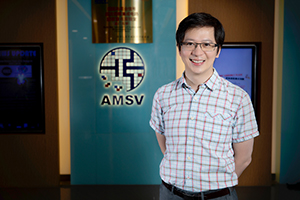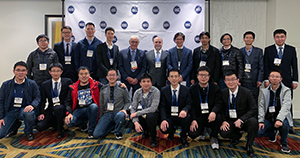Macao has thrived over the past 20 years since its handover to China in 1999, when Prof Elvis Mak Pui In began his journey studying and researching microchips at the University of Macau (UM). An internationally acclaimed expert in integrated circuits, Prof Mak was the first Macao native to be elected a fellow of the Institute of Electrical and Electronics Engineers. ‘UM gives me great opportunities to study subjects of my interest, for which I am most grateful,’ he says.
Great Determination to Succeed
Prof Mak is a professor in UM’s Department of Electrical and Computer Engineering, associate director (research) of the State-Key Laboratory of Analog and Mixed-Signal VLSI, and associate dean of the Institute of Microelectronics. From the outset, he decided to study electrical engineering and electronics out of interest. ‘My undergraduate years opened my eyes to a new discipline, laying a solid foundation for my further study. I found that advanced scientific research is demanding. To succeed in research, you just can’t be too determined,’ he says.
With passion and determination, Prof Mak remained at UM for his doctoral research and became a faculty member in 2006. His personal growth coincided with some remarkable changes in the local society. With the city’s steady economic growth since the handover, the local government stepped up its support for scientific research and established the Science and Technology Development Fund (FDTC in its Portuguese acronym) in 2004. ‘Without FDTC’s support, it would have been difficult for us to achieve what we have achieved,’ says Prof Mak.
Stronger Team at the State Key Laboratory
In 2003, UM’s Vice Rector Rui Martins, who was Prof Mak’s supervisor, founded the Analog and Mixed-Signal VLSI Laboratory, which was elevated to the status of a state key laboratory in 2011. Prof Mak says, ‘After gaining this recognition, we received greater support from the FDTC and saw much progress in the recruitment of students and staff.’
Before UM’s relocation to its current campus on Hengqin Island in 2014, the state key laboratory on the old Taipa campus lacked space, which hindered its development. ‘Nobody thought that we would reach our current size,’ says Prof Mak. ‘Without the new campus, we would not have achieved our current results and size. Today, we have over ten professors and 80 students, 60 of whom are PhD students. I would say that our size has increased fivefold or tenfold.’
Nurturing Students for Long-term Contribution
With over 260 published journal papers, Prof Mak’s achievements have been recognised internationally, but he thinks that academic papers, no matter how well-written they are, will eventually become outdated. What truly matters is nurturing students who can make consistent contributions to society. He has supervised over 20 PhD students, all of whom are working at world-class universities or companies. ‘A former student joined an American company right after his graduation, with an annual salary of 1.5 million patacas. Why would an American company want to hire a Chinese engineer? It is simply because our graduates meet their requirements,’ he says.
While American companies pay a highly competitive salary to attract the best researchers, Prof Mak hopes that the state key laboratory will help the Guangdong-Hong Kong-Macao Greater Bay Area to retain the best scientists and technologists. He says, ‘In the next five to ten years, we hope to encourage talented people to stay in the Greater Bay Area, as well as to nurture enterprises and top-tier research teams. Professors in Macao will help our students build up their skills and knowledge. These students can then make scientific contributions on the frontline and create a well-established industry in the Greater Bay Area.’
澳門回歸20年,恰好是麥沛然在澳門大學學習和研究芯片的20年。他在1999年入讀澳大,今日已是國際頂尖的集成電路領域專家,更是首位澳門土生土長的國際電機電子工程師學會會士。「感激澳大給予我這麼大的研究空間,讓我實踐感興趣的事情。」
「你不認真就輸」
麥沛然是澳大電機及電腦工程系教授、模擬與混合信號超大規模集成電路國家重點實驗室(研究)副主任、微電子研究院副院長。他說當初修讀電機及電子工程,完全是出於興趣。「本科給我的最大感受是打好基礎,從未知到知道這個領域。去到後期,我發現原來高層次的科學對研究人員的水平有很高的要求,不是認真就輸了』,而是你不認真就輸。』
國家重點實驗室成就團隊
憑著一份興趣和認真,麥教授留校攻讀博士,2006年起在澳大任教,這段歷程不僅反映他的成長,也折射了澳門回歸後的變化。他初到澳大時,澳門在電子工程研究上可謂在早期階段,但隨著回歸後經濟日益增長,政府也加大了對科研的支持,包括在2004年設立科學技術發展基金。「如果沒有科技基金的支持,我相信沒有辦法做到比較好的成果。」
2003年,麥教授的導師、澳大副校長馬許願教授創建模擬與混合信號超大規模集成電路實驗室,2011年升格為國家重點實驗室,麥教授一直參與其中。「有這個認可,科技基金便可以更大力地支持我們的研究,我們在收生和招聘方面也有長足進步。」
不過,在澳大2014年遷入現時的校園前,位於氹仔舊校園的國家重點實驗室地方較少,限制了它的發展空間。「當時沒有人預期會發展到今天的規模。沒有新校園,就沒有今天的發展和規模,現在這裡有10多位老師,80多位學生,其中有近60名都是博士學生,如果一定要量化的話,我們的規模是當時的5至10倍。」
培養學生作長遠貢獻
麥教授歷年來發表逾260篇學術論文,備受國際肯定,但他認為論文寫得再好,終究也會過時;相反,培養出好的學生,就能讓他們在社會立足、持續地貢獻社會。過去10多年,他指導了超過20名博士生,畢業後都在世界一流的大學、企業工作。「我有一位學生剛畢業就獲美國的公司聘請,年薪150萬澳門元。美國公司為甚麼要請一個中國人做工程師呢?答案很簡單,就是我們的學生水平達到他們的要求。」
麥教授說,美國企業願意付出優厚的薪酬,容易吸引最一流的科研人才,但他期望實驗室可以協助粵港澳大灣區留住科技人才。「將優秀的人才留在灣區,創造企業、創造頂尖的研究團隊,是未來5至10年希望做的。在澳門的老師可以是學生技術的搖籃,我們的畢業生是貢獻科研的中堅,然後再為灣區孕育成熟的產業。」

Prof Elvis Mak is the first native of Macao to be elected a fellow of the Institute of Electrical and Electronics Engineers
麥沛然教授是澳門首位土生土長的國際電機電子工程師學會會士

UM’s microchips research team present their findings at the 66th International Solid-State Circuits
澳大的芯片研究團隊赴美國參加第66屆國際固態電路研討會並發表研究成果

